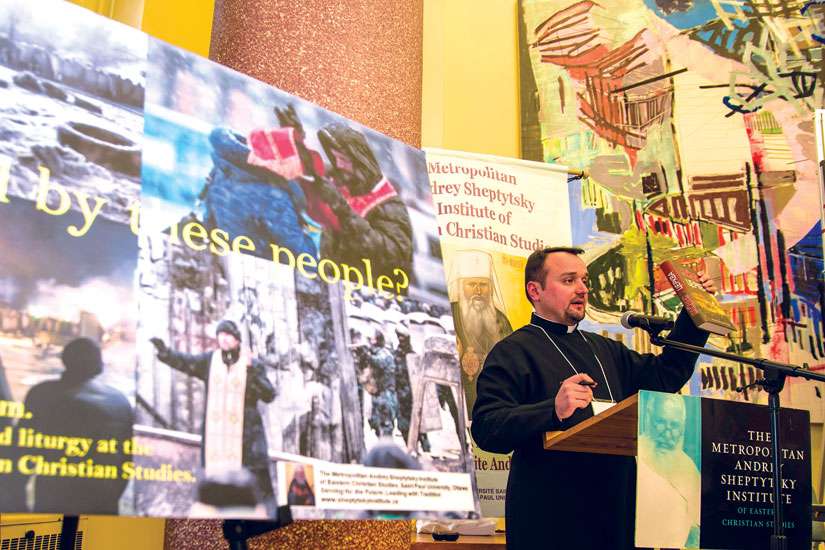“This is the first time Europeans with a European flag had died for European values,” Deacon Roman Zaviyskyy from the faculty of theology at the Ukrainian Catholic University in Lviv, Ukraine, told scholars at the University of St. Michael’s College, University of Toronto.
Zaviyskyy characterized Russia under Putin as “a failed empire still struggling to realize a national identity.”
Given a 20th century in which Russia exchanged a feudal Tsarist empire for a bureaucratized and militarized Soviet empire, Russia in the 21st century still has no experience of a modern nation-state and substitutes the romantic ideal of Slavic unity for a more modest notion of national identity, said the Oxford-educated Catholic Church historian.
“For Russia, the very idea of Ukraine is an offense against the idea of east Slavic unity,” said Zaviyskyy.
The Ukrainian churches are faced with a Russian imperial mindset that is incompatible with both religious freedom and the idea of a civil society separate from the state, said Ukrainian Orthodox Archimandrate Cyril Hovorun. Bishops of the three major churches in Ukraine — Russian Orthodox, Ukrainian Orthodox and Ukrainian Greek Catholic — each dream of a “symphony” in which the Church lends legitimacy to the state and the state relies on the Church hierarchy to unite the people.
“This is really a Byzantine dream,” said Hovorun.
But the symphony has long since broken down for the majority of Ukrainians, said the Orthodox priest and Ukrainian member of parliament.
“The hierarchs are still dreaming their Byzantine dreams. The priests have to feed their families. And the people want to create a better society,” said Hovorun.
The challenge for the Ukrainian churches is to seek a partnership with society, rather than a partnership with the government, said Hovorun.
The Euro-Maidan movement, which brought down the Russian dominated and corrupt government of Viktor Yanukovych, is a “revolution of dignity,” said Zaviyskyy.
Western conservatives who believe Putin is the defender of traditional Christian values from marriage to the unborn are being duped by a propaganda campaign, Zaviyskyy said.
“His concern is power. He successfully sells to his customers in the West his defence of traditional Christian values,” he said.
Meanwhile the Ukrainian Othodox and Catholic Churches are calculating how they should react to an “ecumenism from below” on the maidan. Priests, deacons, students and politicians forged partnerships across church and linguistic lines based on common Christian values, said Zaviyskyy.
“Ecumenism from below was stronger than ecumenism from above,” he said. “A whole young generation has been inspired by the martyrdom of their fellow young Ukrainians, regardless of their language preferences.”
Jewish-Ukrainian historian Igor Shchupak, director of the Ukrainian Institute for Holocaust Studies, characterized Russian attempts to turn Ukraine into a client state as a “war against Western, democratic values.”
“It is a war against ethnic Ukrainian people who are Catholic, Orthodox, Jewish, Muslim,” he said.
Some extremist, nationalist groups who tried to associate themselves with the Euro-Maidan movement are virulently anti Semitic, but most Jews see a clear distinction between the tiny fascist groups and the Euro-Maidan movement, said Shchupak.
“There was no anti-Semitism on the Maidan,” he said.
In the election to replace Yanukovych as president, the ultranationalist and anti-Semitic Svoboda party received just over one per cent of the vote.
Sponsored by the Metropolitan Andrey Sheptytsky Institute of Eastern Christian Studies at Saint Paul University in Ottawa, the Toronto conference was an opportunity to separate the conversation about the future of Ukraine from Russian propaganda, said Sheptytsky Institute acting director Fr. Peter Galadza.
“This conference is an opportunity to counter stereotypes,” Galadza said. “It’s all about enlightment.”


